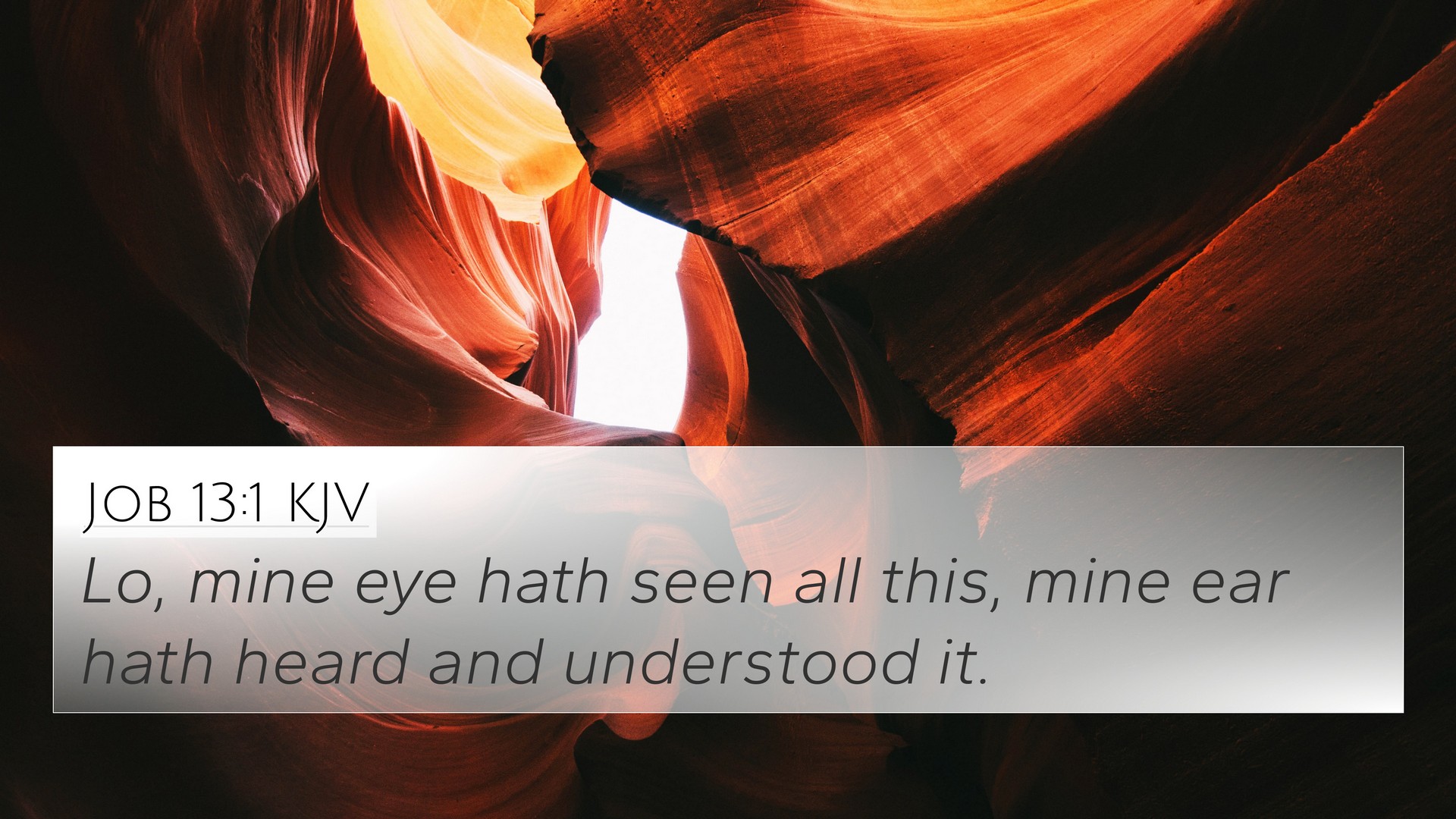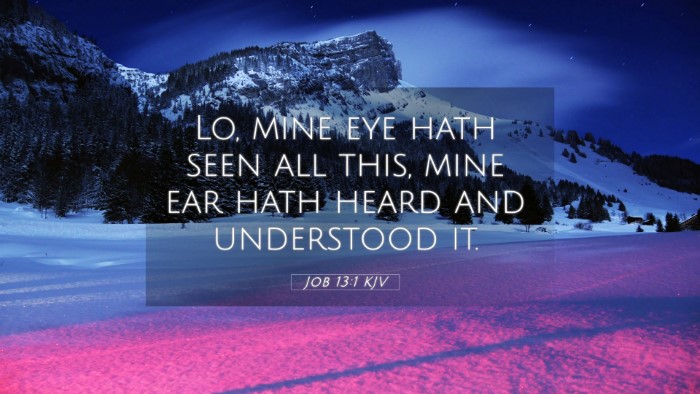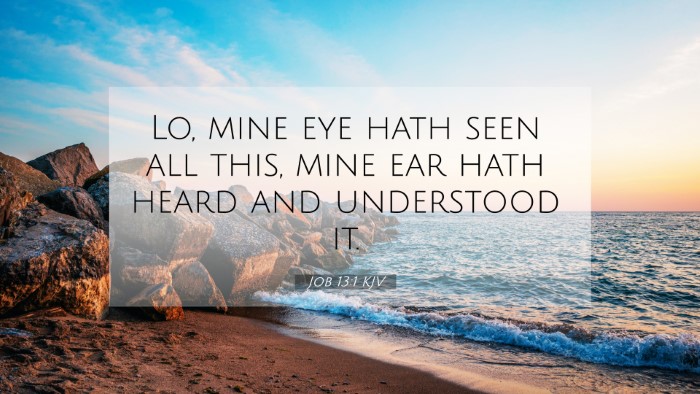Old Testament
Genesis Exodus Leviticus Numbers Deuteronomy Joshua Judges Ruth 1 Samuel 2 Samuel 1 Kings 2 Kings 1 Chronicles 2 Chronicles Ezra Nehemiah Esther Job Psalms Proverbs Ecclesiastes Song of Solomon Isaiah Jeremiah Lamentations Ezekiel Daniel Hosea Joel Amos Obadiah Jonah Micah Nahum Habakkuk Zephaniah Haggai Zechariah MalachiJob 13:1 Similar Verses
Job 13:1 Cross References
Lo, mine eye hath seen all this, mine ear hath heard and understood it.
Uncover the Rich Themes and Topics of This Bible Verse
Listed below are the Bible themes associated with Job 13:1. We invite you to explore each theme to gain deeper insights into the Scriptures.
Job 13:1 Cross Reference Verses
This section features a detailed cross-reference designed to enrich your understanding of the Scriptures. Below, you will find carefully selected verses that echo the themes and teachings related to Job 13:1 KJV. Click on any image to explore detailed analyses of related Bible verses and uncover deeper theological insights.

Job 42:3 (KJV) »
Who is he that hideth counsel without knowledge? therefore have I uttered that I understood not; things too wonderful for me, which I knew not.

Job 8:8 (KJV) »
For enquire, I pray thee, of the former age, and prepare thyself to the search of their fathers:

1 John 1:3 (KJV) »
That which we have seen and heard declare we unto you, that ye also may have fellowship with us: and truly our fellowship is with the Father, and with his Son Jesus Christ.
Job 13:1 Verse Analysis and Similar Verses
Understanding Job 13:1
Job 13:1 states: "Lo, mine eye hath seen all this, mine ear hath heard and understood it." This verse marks a significant moment in Job's discourse, where he reflects on the experiences that have shaped his understanding and perception of reality. Below, we will explore the insights provided by public domain commentaries, alongside relevant cross-references to enhance comprehension.
Contextual Summary
Job, a man who has endured immense suffering, speaks to his friends and, by extension, to God about his experiences. His declaration demonstrates a sense of awareness and reflection, emphasizing that he is not only a passive observer of his suffering but one who has engaged with it deeply.
Insights from Commentaries
-
Matthew Henry:
Henry suggests that Job's assertion of seeing and hearing all signifies his confrontation with both the divine and human understanding of suffering. He emphasizes that true wisdom comes from experiencing and reflecting upon one's trials, rather than from superficial knowledge.
-
Albert Barnes:
Barnes interprets this verse as Job indicating that he possesses the insight gained through experience. It highlights the importance of experiential knowledge over mere hearsay in understanding one's circumstances and God's overarching plan.
-
Adam Clarke:
Clarke remarks that Job's words demonstrate a certainty that transcends doubt—he has witnessed the trials he speaks of and thus carries a weight of understanding that his friends may lack.
Bible Verse Cross-References
To further expand the understanding of Job 13:1, here are some pertinent cross-references:
- Job 12:12: "With the ancient is wisdom; and in length of days understanding."
- Psalms 119:130: "The entrance of thy words giveth light; it giveth understanding unto the simple."
- Proverbs 3:13: "Happy is the man that findeth wisdom, and the man that getteth understanding."
- Isaiah 40:28: "Hast thou not known? hast thou not heard, that the everlasting God, the Lord, the Creator of the ends of the earth, fainteth not, neither is weary?"
- Romans 5:3–4: "And not only so, but we glory in tribulations also: knowing that tribulation worketh patience; and patience, experience; and experience, hope."
- 2 Corinthians 1:5: "For as the sufferings of Christ abound in us, so our consolation also aboundeth by Christ."
- Hebrews 12:11: "Now no chastening for the present seemeth to be joyous, but grievous: nevertheless afterward it yieldeth the peaceable fruit of righteousness unto them which are exercised thereby."
Connections between Bible Verses
This verse, Job 13:1, not only stands alone in expressing the suffering and wisdom gained through trials but also connects with various biblical themes. The alternation of trials and wisdom is a crucial theme woven throughout Scripture:
-
Thematic Connections:
The essence of human suffering leading to insight can be seen through:
- **Job’s trials mirrored in New Testament teachings**: Such as Romans 5:3-4, where Paul teaches about the progression from tribulation to hope.
- **Comparative studies of suffering in the Scriptures**: Linking Job's experience with the suffering of Christ, highlighting the depth of understanding that arises from profound pain.
-
Inter-Biblical Dialogue:
The exploration of wisdom through experience in Job relates closely to the wisdom literature of the Bible, particularly:
- **Psalms and Proverbs**: Texts that repeatedly emphasize the value of wisdom, urging followers to seek understanding as Job did.
- **The Gospels' application of wisdom**: Jesus' teachings reflect the transformation of suffering into enlightenment.
How to Use Bible Cross-References Effectively
Understanding and interpreting scripture can be enhanced through cross-referencing, a strategy that opens pathways to deeper insights. Here are some tips:
-
Utilizing Tools for Bible Cross-Referencing:
- Employ a Bible concordance for identifying similar themes across different scriptures.
- Consult a Bible cross-reference guide for systematic study.
- Use a cross-reference Bible study approach to explore thematic connections.
-
Practical Example of Cross-Referencing:
- When studying Job 13:1, one might compare it with James 1:5, which underscores the pursuit of wisdom directly from God.
- Linking Job’s insights with Romans 5:3-4 allows for a broader understanding of how trials produce experience and hope.
Conclusion
Job 13:1 serves as a profound reminder of the interplay between suffering and wisdom. Through various biblical cross-references and commentary insights, we can discern a deeper understanding of our trials and the knowledge that stems from them. The connections between this verse and others throughout Scripture enrich our theological study and personal reflection, guiding us in our ongoing journey of faith.








